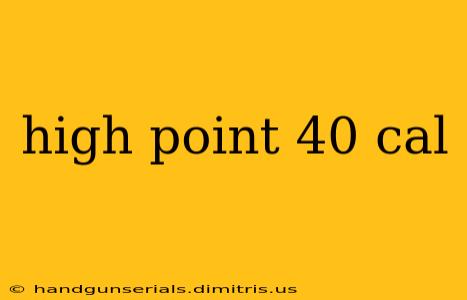High Point Firearms is known for producing budget-friendly firearms, and their 40 caliber pistols are no exception. This guide provides a comprehensive overview of High Point's 40 caliber offerings, examining their features, pros, cons, and overall suitability for various users. We'll delve into the specifics of their design, reliability, and common user experiences.
High Point's 40 Caliber Models: A Closer Look
While High Point's lineup changes occasionally, several 40 caliber models have consistently been available. These typically include semi-automatic pistols featuring similar designs, differing primarily in size and capacity. Specific model names and features should always be verified directly with High Point's official website for the most up-to-date information.
Common Features Across High Point 40 Cal Models:
- Polymer Frames: High Point frequently uses polymer frames for lightweight and cost-effective construction.
- Large Capacity Magazines: Many models offer double-stack magazines for a high round capacity, beneficial for self-defense or range use.
- Simple Design: The internal mechanisms are generally straightforward, which can translate to easier maintenance in some cases.
- Affordable Price Point: This is arguably the most significant draw for High Point pistols. They provide a less expensive entry into handgun ownership.
Pros and Cons of High Point 40 Caliber Pistols
Choosing a firearm is a deeply personal decision. Weighing the pros and cons is critical before making a purchase.
Advantages:
- Cost-Effectiveness: The most significant advantage is the low price point. For individuals on a budget, it offers accessibility to handgun ownership.
- High Capacity: The higher magazine capacity offers a greater number of rounds available in a self-defense scenario.
- Relatively Easy Maintenance: The simpler design generally makes routine maintenance and cleaning less complicated.
Disadvantages:
- Build Quality Concerns: High Point firearms are often criticized for perceived lower build quality compared to more established brands. This can manifest in issues such as fit, finish, and durability.
- Accuracy and Reliability: Some users report inconsistent accuracy and occasional reliability problems, particularly with older models or those inadequately maintained.
- Aftermarket Support: The availability of aftermarket parts and accessories might be more limited compared to more popular brands.
- Resale Value: Due to the lower initial cost, the resale value of High Point firearms is generally lower.
Considerations for Potential Buyers
Before purchasing any High Point 40 caliber handgun, or any firearm for that matter, consider these factors:
- Training: Proper firearm training is crucial regardless of the brand or model. Seek professional instruction to learn safe handling, cleaning, and responsible gun ownership.
- Reliability Testing: If possible, thoroughly test the firearm's reliability at a shooting range before relying on it for self-defense.
- Alternative Options: Compare High Point pistols with other firearms in a similar price range or those offering potentially better build quality and reliability.
- Legal Compliance: Ensure you comply with all federal, state, and local laws regarding firearm ownership and carry permits.
Conclusion
High Point 40 caliber pistols offer an accessible entry point to handgun ownership due to their affordability. However, potential buyers should carefully weigh the trade-offs between cost, reliability, and build quality. Thorough research, professional training, and careful consideration of individual needs are essential before making a purchase decision. This information is for educational purposes only and does not constitute a recommendation for any specific firearm. Always consult with a firearms expert and adhere to all applicable safety regulations.

